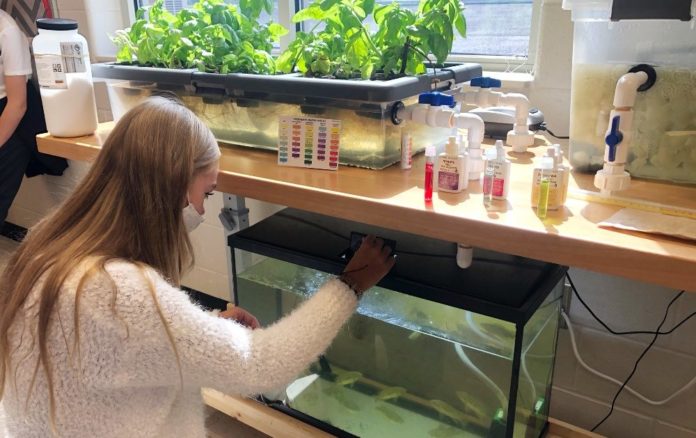Despite challenges imposed by COVID-19, teachers in Gwinnett County’s Archer School Cluster are working to make science more exciting than ever this fall.
Through an innovative AgSTEM research project utilizing aquaponics and smart sensor technology, and with support from an interdisciplinary team of research faculty, Archer educators are being equipped with the tools and resources to teach every subject through the lens of urban agriculture and conservation.
Mercer University’s STEM Education Innovation (SEI) Lab, in collaboration with Gwinnett’s Soil and Water Conservation District (the District) and the USDA Natural Resources Conservation Service (NRCS) Lawrenceville District office, has engaged regional partners to implement agriculture-based science, technology, engineering and math (AgSTEM) in the Archer Cluster.
The District awarded Mercer $50,000 in funding to administer this initiative, led by Dr. Justin Ballenger and Dr. Elaine Thurmond, both faculty members in the University’s Tift College of Education. A portion of the funding supports graduate research fellowships for four Ph.D. candidates — Jami Friedrich, Stacey Young Rivers, Tynetta Jenkins and Caitlin Hochuli — in the College of Education.
“This was a phenomenal opportunity to help design and implement a program with experts in the field,” said SEI Lab Fellow Rivers. “SEI provided a valuable engagement for us to practically apply what we are learning at Mercer while leveraging our individual expertise to create a dynamic experience for educators.”
In collaboration with faculty, SEI Lab Fellows assisted in the creation of professional development sessions for Archer educators and are providing guidance and feedback for the AgSTEM curriculum under development in the cluster.
Partners at the University of Georgia’s Warnell School of Forestry, Clark Atlanta University’s Center for Innovation and Entrepreneurial Development, and the Department of Defense STARBASE program helped design the aquaponics kits as well as provide consultation and expertise.
“We anticipated funding a handful of aquaponics systems for schools interested in expanding their school gardening program,” said Tixie Fowler, district program assistant for the Gwinnett County Conservation District. “It made sense to offer the aquaponics kits with activities, but we noticed there was very little existing material. So we thought we’d engage a few teachers to help develop instructional material. What we didn’t expect was the incredible degree of excitement this idea would spark. The connections and resources that have jumped aboard are astounding.”
To implement the AgSTEM curriculum, Fowler and SEI Lab Director Dr. Ballenger invited administrators in the Archer School Cluster to participate in the K-12 pilot program. With their support and buy-in of their STEM teaching teams, the District equipped Archer’s five schools with aquaponics kits while UGA/Warnell provided tilapia and basil as the first crop.
Aquaponics is a farming method that connects aquaculture (i.e. fish production) to hydroponic plant growth in a circulating system that utilizes 90% less water than traditional growing methods. The fish provide water and nutrients to feed the growth of plants.
Continue reading about the AgSTEM research project at news.mercer.edu.









